(人教版)初中英语九年级Unit13单元测试01(含答案)
人教版九年级全册英语Unit13单元测试卷(Word版,含答案)
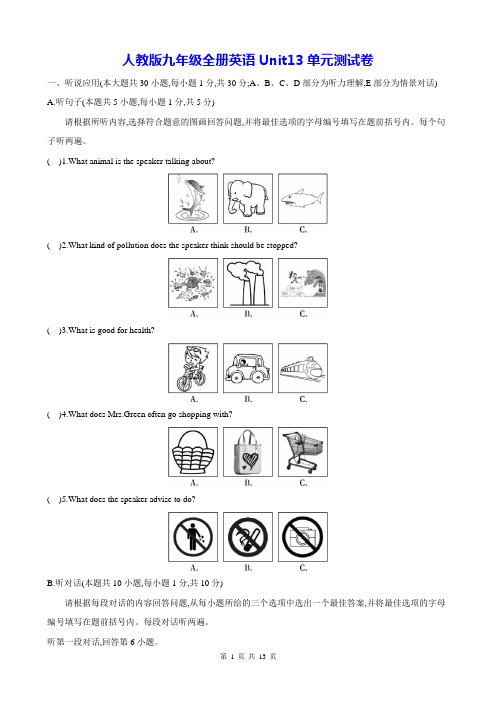
人教版九年级全册英语Unit13单元测试卷一、听说应用(本大题共30小题,每小题1分,共30分;A、B、C、D部分为听力理解,E部分为情景对话)A.听句子(本题共5小题,每小题1分,共5分)请根据所听内容,选择符合题意的图画回答问题,并将最佳选项的字母编号填写在题前括号内。
每个句子听两遍。
( )1.What animal is the speaker talking about?( )2.What kind of pollution does the speaker think should be stopped?( )3.What is good for health?( )4.What does Mrs.Green often go shopping with?( )5.What does the speaker advise to do?B.听对话(本题共10小题,每小题1分,共10分)请根据每段对话的内容回答问题,从每小题所给的三个选项中选出一个最佳答案,并将最佳选项的字母编号填写在题前括号内。
每段对话听两遍。
听第一段对话,回答第6小题。
( )6.How will the boy’s mom deal with the old clothes?A.Throw them away.B.Make some shopping bags with them.C.Give them away to others.听第二段对话,回答第7小题。
( )7.What does the boy’s grandpa like doing after a meal now?A.Walking the dog.B.Smoking.C.Reading the newspaper.听第三段对话,回答第8小题。
( )8.What is the house made of?A.Rubbish.B.Paper.C.Grass.听第四段对话,回答第9小题。
人教九年级英语unit 13单元测试卷(含答案)

Unit 13单元测试卷I.单项选择(每小是1分,共15分)( )1. -Excuse me, haven't you learned the new traffic ?Everyone in a car must wear the seat belt.- Sorry, we won’t do that again.A.articleB. lawC.agreementD. education( )2. Jeremy Lin an unknown basketball player in New York Knicks for quite a long time.ed to beB. used to beingC. is used to beD. was used to be( )3. As a student, you should know how to put your time good use.A.forB. withC. inD. to( )4. -Do you know the price of the ticket?-Yes. Each ¥180.A.paysB.costsC.takesD. spends( )5. -The paper says Iron Man 3 is on this evening. Let's go and see it.-But I it.A.seeB.sawC. have seenD. will see( )6.-Why don't you buy the bike. Mary?-It's too expensive. I can't it.A.sellB. lendC. keepD. afford ( )7.- Why do you never wear the skirt I bought you?-It's . I don't like it.A.beautifulB.expensiveC. uglyD. faours( )8. Many young people took part in trees on Tree Planting Day.A.plantingB. plantsC. to plantD. plant( )9. my father my grandpa is flying to Singapore this weekend. They will visit my uncle there.A. Neither;norB. Either;orC. Both;andD. Not only; but also ( )10. This kind of paper is very good. They are wood.A.made B made of C made by D. made from( )11. In our school library there a number of books on science,and in these years the number of them growing larger and larger.A.are;isB.is;areC.have; areD.has;is( )12.I’m very sorry to see the water in the river. It smells terrible.A.polluteB.pollutionC. pollutedD. polluting( )13. Yesterday I visited a park and I couldn't believe I saw.A.howB. whatC. thatD.which( )14. The meat is producing a terrible smell, !A. Throw it awayB. Cut it upC. Eat it upD. sell it out( )15. -What a strong sandstorm! ?-I’m afraid so.We’re getting into the sandstorm season now.A. Do you like sandstorm daysB. Will it be sunnyC. Will you stay at homeD. Will it last longII完形填空(每小题2分,并20分)Rob Howes wanted to spend a day at the beach. He 16 his daughter Nicky and her two friends, Helen Slade and Karina Coope. They all went to Ocean Beach in New Zealand, where Howes was a lifeguard.The group swam and bodysurfed. Then they saw something 17 ."Suddenly, there are these fins,” said Howes.The 18 saw seven dolphins (海豚)moving towards them. The dolphins seemed worried. They 19 the water with their tails. They kept moving in a circle around the swimmers. Then one large dolphin swam towards Howes and Helen. Next, it dived(潜水) down underwater. That's when Howes saw something grey moving in the 20 .A great white shark 21 underwater. It wasn’t far from the people. The shark headed straight towards Nicky and Karina. Now the shark was not slow, It moved 22 ! So the dolphins used their tails to swim even faster. Each one splashed(溅)its tail even more. Then Howes knew 23 the dolphins did so.The dolphins didn’t want to 24 him and the girls. These sea mammal(哺乳动物) wanted to keep them safe.The dolphins stayed close to the group 25 the shark left. When Howes and the kids were safe, the dolphins swam away."You want to say thank you and shake their flippers(鳍)."Howes said. This isn't a fishy tale! These dolphins are heroes. ( )16. A. brought B. missed C. returned D. searched( )17. A. broken mon C. strange D. polluted( )18. A.Trainers B. coaches C. fishermen D.swimmer( )19.A. held B. hit C. cleaned D.provided( )20. A. pool B. air C. island D. water( )21. A. waited B. washed C. grew D. served( )22. A. beautifully B. fast C. he D. away( )23. A. where B. what C. why D.whether( )24.A. play B. trust C. harm D.protect( )25. A. until B. because C. if D.sinceIII.阅读理解(每小题2分,共20分)ABig ocean fish have almost disappeared from the world since the start of industrial(产业的)fishing in the 1950s. Researchers found that the number of large fish had dropped by 90 percent in the past fifty years.The study took ten years. The researchers collected records from fishing companies and governments around the world. The magazine Nature published the findings.The researchers say the common way called longline fishing is especially bad for large fish. The longline includes many fishing lines that are connected to one boat. If these lines are joined together,they can reach one hundred kilometers. They hold thousands of sharp(锋利的) metal hooks(钩子) to catch fish. Longline fishing is especially common inthe Japanese fishing industry. Records showed that Japanese boats used to catch about ten fish for per hundred hooks. The study says longline fishing boats now may catch one fish for per hundred hooks.The researchers say industrial fishing can destroy groups of fish much faster than the ways of fishing in the past. The study suggests that large fish can disappear almost completely from new fishing areas within ten to fifteen years Ocean life systems (系统) could be destroyed.It's not the only worry that the number of large fish is becoming smaller and smaller. What’s worse, they are smaller in size than their ancestors.( )26. What does the underlined word "published” mean in Chinese?A.刊登B.发现C.研究D.调查( )27. According to the passage, what's the reason why the number of big ocean fish has dropped?A. The ocean has been polluted.B. Longline fishing has been used.C. The scientists has paid little attention.D. Japanese fishing boats catch fewer and fewer fish.( )25. According to the passage, which of the following about industrial fishing is TRUE?A.It should be encouraged.B. It can balance ocean life systems.C. It started in the 1960.D. It can destroy groups of fish much faster than before.( )29. Where is the passage probably taken from?A. A storybook.B. A fashion magazine.C. An environmental report.D. A sports newspaper.( )0. Which is the best title of the passage?A. The ancestors of big ocean fish.B. Japanese fishing industry.C. Modern ways of fishing.D. Worrying situation of big ocean fish.BSome of the greatest problems we face today are the destruction(破坏)of our environment. Brown, polluted water, endangered wild animals, these problems seem so huge.So my family does what we can. We take cloth bags to stores instead of using plastic bags. We walk where we don't have to drive…But does it do any good? When I am the only one in line at the market with cloth bags. am I doing any good? Does my walking to stores make any real difference to the world?I recently learned something about flamingos(火烈鸟)which like to get together in groups of a thou-sand or more. Every year, when the time comes or migration(迁徙), few of them first take off from the lake. But none of the others seem to notice, so the smallgroup returns. However, the next day they try again. This time few more fly along with them, but most of them still pay no attention,so they return again.They try for several times Every time a few more birds join in but, since thousands of the others still take no notice, the great migration plan is once more stopped.Then one day something changes. The same small group of birds once again starts flying and a small number more join in just as before, then more. Finally, they all take light and the migration really begins.What a spectacular sight it must be- thousands of flamingos taking off into the sky at once.A few can make a difference. Even if you're the one to take the first step, and continue trying, others will someday take notice and together we will solve even our greatest problems.( )31. Where would you most probably read this passage?A. A guidebook.B. A movie poster.C. A personal blog(博客).D. A geology(地质) magazine.( )32. Why does the writer use cloth bags in stores?A. Because he wants to do some good to the environment.B. Because he thinks plastic bags are more expensive.C. Because there are only cloth bags in stores.D. Because all the people use cloth bags in stores( )33. What does the underlined word"spectacular"in Paragraph 5 probably mean?A. Frustrating.B.Surprising.C. Terrible.D. Fantastic ( )34. Which of the following is TRUE according to the passage?A. Even if we can walk there, we still drive overB.Flamingos like to get together in groups of a thousand or more.C. Brown clouds and polluted water are the only problems we face today.D. When a few of the flamingos first take off from the lake, all the others follow at once( )35. What's the writer s purpose of writing this article?A. To show that the writer loves to see the migration of flamingos.B.To tell readers to continue trying and it can make a difference.C. To introduce a special kind of flamingo to readers.D. To show that there re many problems in the world.Ⅳ.短文填空(每小题2分,共20分)根据短文内容,用方中所给单词或短语的正确形式填空,使短文完整、正确。
人教版九年级英语上册 第十三单元测试卷(附参考答案

人教九上英语测试卷笔试第十三单元一、()1.He go out with his parents, but now he staying at home alone.ed to; is used toB.is used to; used toed to; used toD.is used to; is used to二、()2.The interesting book me 10 yuan.A.spentB.tookC.paidD.cost三、( )3.I can’t afford him an expensive birthday present.A.to buyB.buyingC.for buyingD.buy四、( )4.—Remember to the lights when you leave the room.—OK, I will.A.turn onB.turn downC.turn upD.turn off五、( )5.Not only my friends but also I interested in football and Messi is our favorite star.A.beB.amC.isD.are六、( )6.The old man looked .The children were afraid of him.A.uglyB.niceC.embarrassedD.foolish七、( )7.We must do something useful to pollution.A.cut offB.cut upC.cut downD.cut in八、( )8.The photos many pleasant memories.A.brought upB.brought backC.took upD.took back九、( )9.—What are the of bike riding?—It can help reduce air pollution.A.advantagesB.reasonsC.resultsD.ideas十、( )10.—Have you a club?—Yes, I’m in a swimming club and I often the swimming training.A.joined; take part inB.joined; joinC.taken part in; joinD.taken part in; join in十一、完形填空。
人教版九年级英语全册Unit 13单元测试题(含答案)
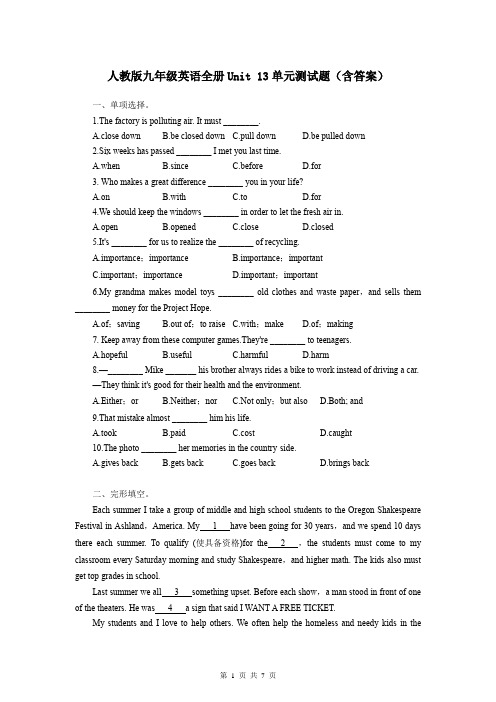
人教版九年级英语全册Unit 13单元测试题(含答案)一、单项选择。
1.The factory is polluting air. It must ________.A.close downB.be closed downC.pull downD.be pulled down2.Six weeks has passed ________ I met you last time.A.whenB.sinceC.beforeD.for3. Who makes a great difference ________ you in your life?A.onB.withC.toD.for4.We should keep the windows ________ in order to let the fresh air in.A.openB.openedC.closeD.closed5.It's ________ for us to realize the ________ of recycling.A.importance;importanceB.importance;importantC.important;importanceD.important;important6.My grandma makes model toys ________ old clothes and waste paper,and sells them ________ money for the Project Hope.A.of;savingB.out of;to raiseC.with;makeD.of;making7. Keep away from these computer games.They're ________ to teenagers.A.hopefulefulC.harmfulD.harm8.—________ Mike _______ his brother always rides a bike to work instead of driving a car.—They think it's good for their health and the environment.A.Either;orB.Neither;norC.Not only;but alsoD.Both; and9.That mistake almost ________ him his life.A.tookB.paidC.costD.caught10.The photo ________ her memories in the country-side.A.gives backB.gets backC.goes backD.brings back二、完形填空。
人教版九年级英语全册 Unit 13 单元测试题(含答案)
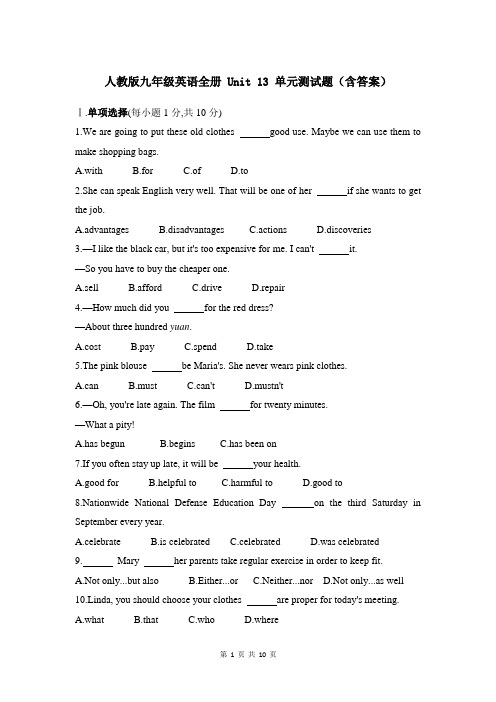
人教版九年级英语全册 Unit 13 单元测试题(含答案)Ⅰ.单项选择(每小题1分,共10分)1.We are going to put these old clothes good use. Maybe we can use them to make shopping bags.A.withB.forC.ofD.to2.She can speak English very well. That will be one of her if she wants to get the job.A.advantagesB.disadvantagesC.actionsD.discoveries3.—I like the black car, but it's too expensive for me. I can't it.—So you have to buy the cheaper one.A.sellB.affordC.driveD.repair4.—How much did you for the red dress?—About three hundred yuan.A.costB.payC.spendD.take5.The pink blouse be Maria's. She never wears pink clothes.A.canB.mustC.can'tD.mustn't6.—Oh, you're late again. The film for twenty minutes.—What a pity!A.has begunB.beginsC.has been on7.If you often stay up late, it will be your health.A.good forB.helpful toC.harmful toD.good to8.Nationwide National Defense Education Day on the third Saturday in September every year.A.celebrateB.is celebratedC.celebratedD.was celebrated9.Mary her parents take regular exercise in order to keep fit.A.Not only...but alsoB.Either...orC.Neither...norD.Not only...as well10.Linda, you should choose your clothes are proper for today's meeting.A.whatB.thatC.whoD.whereⅡ.完形填空(每小题2分,共20分)Most polar (北极) bears could disappear by the end of the century because of global (全球) warming, scientists say.According to a study in Nature Climate(气候) Change, thenumber of polar bears will11rapidly by 2080. There are tworeasons. One is that the sea ice is melting (融化). Polar bears catchseals (海豹) to eat on the ice. 12ice, they have to stay on land. But there is no 13food on land to support so many polar bears. The animals could die from hunger. The other reason is that mother polar bears may not be fat enough to14 milk for their babies, so some bears could stop having babies.Polar bears are15land animals that eat meat on the planet. They help control other kinds of animals. Losing them would break the balance of their living place.The Arctic Ocean (北冰洋) is 16to about 25,000 polar bears. Arctic sea ice usually melts in spring and summer, and then grows in winter. But now, the17 is taking longer to grow back. Scientists say the Arctic is warming twice as fast as the rest of the planet.The study also shows18it is possible to slow Arctic ice melting. Greenhouse gases (温室气体) could lead to climate change. In order to avoid creating greenhouse gases, the world should try to stop burning coal and driving cars.Saving the bears is19us. Holland, one of the writers of the study, says, “I believe there is hope, but humans need to act20to make that hope come true.” Let's take action to protect our earth and save polar bears.11.A.develop B.fall C.increase D.improve12.A.Through B.Across C.Without D.Except13.A.enough B.good C.sweet D.delicious14.A.protect B.process C.prepare D.produce15.A.the largest B.the loveliest C.the simplest D.the luckiest16.A.room B.family C.house D.home17.A.sea B.ice C.plant D.animal18.A.if B.when C.that D.whether19.A.up to B.hard on C.good with D.thankful to20.A.widely B.clearly C.quickly D.quietlyⅢ.阅读理解(每小题3分,共30分)AAre you interested in animals and nature? Want to enjoy your summer holiday and learn something interesting and useful?Here comes your CHANCE! Youth Explore has prepared a three⁃day summer program for you. You can take part in many hands⁃on activities and meet living animals—giraffes, pandas, tigers, and so on!More information about the program is as follows:Age: Students aged 8—16.Groups: There are 2 programs for you to choose from. Each program needs at most 15 students.Program ADates: January 16—18Days: Monday to WednesdayTime: 10:00 a.m.—4:00 p.m.Program BDates: February 7—9Days: Tuesday to ThursdayTime: 10:00 a.m.—4:00 p.m.Program cost: $230 for each member;$250 for each non⁃member.How to do: Simply come to our centre to get an application form(申请表). Send your completed form on or before January 3rd.Notes:1.No free lunches are provided because of personal food differences. You may either bring a lunch box or pay for lunch at our restaurant.2.Both programs will start one day later if there is a warning of rainstorms.Come and join us now! Don't miss the chance!21.Who can join the three⁃day summer program?A.A kid of 14.B.A boy of 7.C.A girl of 17.D.A man of 26.22.If there is a rainstorm on February 7th, Program B will start on .A.TuesdayB.MondayC.SundayD.Wednesday23.Two members and one non⁃member should pay .A.$690B.$710C.$730D.$75024.Free lunches aren't provided because .A.the lunches cost too muchB.there are many restaurantsC.people have different tastesD.they may bring lunch boxes25.The passage is a .A.poemB.storyC.posterD.novelBWhen Sally was a child, she went to the city park with her mom on a sunny morning. She felt very unhappy. Her mom saw that and asked why. Sally told her mother that she felt so sorry to see so much rubbish on the ground.Her mom looked around. There were pieces of paper, boxes, glass bottles and a lot of other rubbish everywhere. “What can we do?” asked Sally sadly. “I'm sure you will think of something,” said her mom.As soon as Sally got home with her mom, she painted a picture of the park and wrote a sign in large black letters on the top of the picture. The sign said, “PLEASE KEEP OUR PARK CLEAN”. Later, she took plenty of bags and went back to the park with her mom. Sally put up her picture on a big rubbish box.The children in the park ran over to see what was going on. Sally handed each of them a bag. “Let's clean up this place,” said Sally. Then they began to pick up the rubbish, talking and laughing. Soon, all the bags were full.Then Sally's mom led them to put the rubbish into different kinds of rubbish boxes. When they looked at the clean park, they all had a strong feeling of satisfaction.From then on, Sally has been keeping doing the cleaning and sorting(分类) rubbish. More and more people joined her to play a part in environmental protection.26.Why was Sally unhappy?A.Because she couldn't find her mom.B.Because her friends were not in the park.C.Because there was too much rubbish.D.Because the park was too crowded.27.Sally drew the picture to .A.show off her painting skillsB.encourage people to keep the park cleanC.give her mom a big surpriseD.show people how beautiful the park was28.What did the children do in the park when they saw Sally put up her picture?A.They laughed at Sally.B.They spent a terrible and tiring day.C.They bought some bags from Sally.D.They joined Sally in picking up the rubbish.29.How do you like Sally?A.Warm⁃hearted.B.Brave.C.Hard⁃working.zy.30.What's the best title for the text?A.A beautiful parkB.Sally and her momC.A clean⁃up storyD.How to clean the parkⅣ.短文填空(每小题2分,共20分)阅读短文,从方框中选出合适的词,并用其适当形式填空,使短文内容完整、连贯。
人教版英语九年级单元测试题附答案Unit 13

九年级英语单元检测题(十三)Class Name No. Score一、听力理解(本大题共20小题,每小题1分,满分30分)第一节、听句子,根据句子的内容选择正确的图片回答问题,每段录音听一遍。
每小题听一遍。
( )1.A B C( )2.( )3.( )4.( )5.第二节、听对话或独白,根据每段对话或独白的内容选择正确答案回答问题。
每段录音听两遍。
听第一段对话,回答第6小题。
( )6. What is the table made of?A. Wood.B. Plastic.C. Stone.听第二段对话,回答第7小题。
( )7. What keeps the girl from sleeping well?A. The sound of singing.B. The loud noise.C. The sound from the bird.听第三段对话,回答第8小题。
( )8. What did the river use to be like?A. Beautiful.B. Dirty.C. Clean.听第四段对话,回答第9小题。
( )9. How does the girl go to school?A. By bus.B. On foot.C. Both by bus and on foot.听第五段对话,回答第10小题。
( )10. What did the girl stop doing last year?A. Using paper napkins.B. Using paper.C. Recycling paper.听第六段对话,回答第11至12小题。
11-15 BCABC( )11. Where has Bob been?A. To a car factory.B. To a park.C. To a farm.( )12. Why has the lake become dirty?A. Because factories are putting waste into the lake.B. Because there were too many dead fish.C. Because the visitors threw rubbish into the lake.听第七段对话,回答第13至15小题。
人教新目标九年级英语全册Unit 13单元测试题 (含答案)
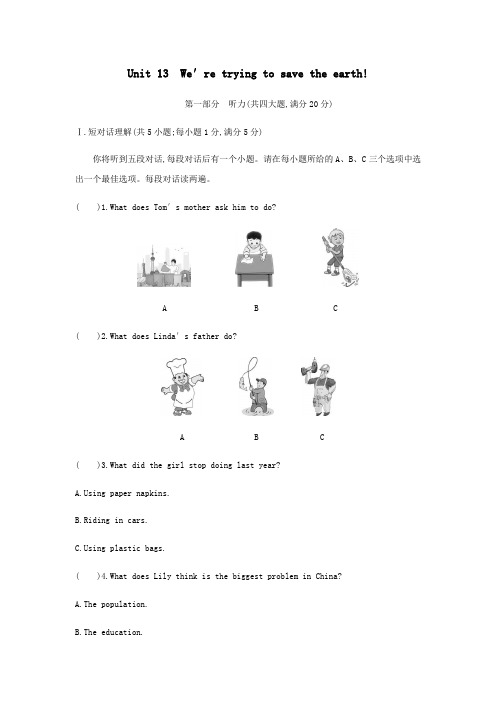
Unit 13 We′re trying to save the earth!第一部分听力(共四大题,满分20分)Ⅰ.短对话理解(共5小题;每小题1分,满分5分)你将听到五段对话,每段对话后有一个小题。
请在每小题所给的A、B、C三个选项中选出一个最佳选项。
每段对话读两遍。
( )1.What does Tom′s mother ask him to do?A B C( )2.What does Linda′s father do?A B C( )3.What did the girl stop doing last year?ing paper napkins.B.Riding in cars.ing plastic bags.( )4.What does Lily think is the biggest problem in China?A.The population.B.The education.C.The pollution.( )5.What business are the two speakers talking about?A.Whale watching.B.Whale catching.C.Whale protecting.Ⅱ.长对话理解(共5小题;每小题1分,满分5分)你将听到两段对话,每段对话后有几个小题。
请在每小题所给的A、B、C三个选项中选出一个最佳选项。
每段对话读两遍。
听下面一段对话,回答第6至7小题。
( )6.Where has Nick been?A.A machine factory.B.A paper factory.C.A chemical factory.( )7.What will the woman do?A.Call the TV station.B.Send the video to the TV station.C.Put the video online.听下面一段对话,回答第8至10小题。
(人教版)初中英语九年级 Unit 13单元测试卷及答案
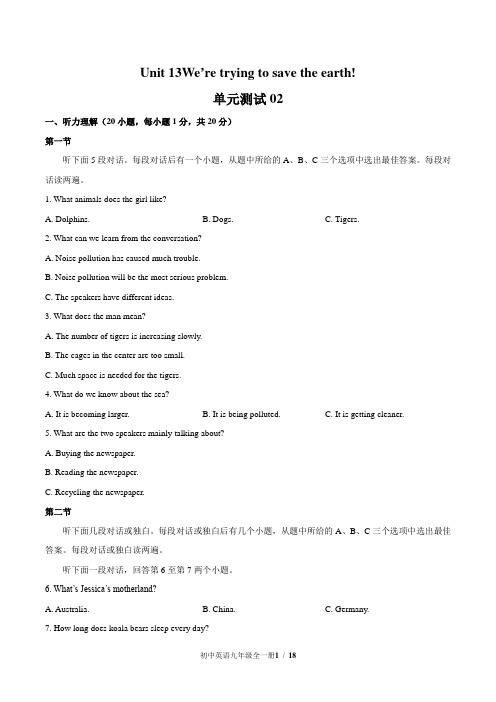
Unit 13We’re trying to save the earth!单元测试02一、听力理解(20小题,每小题1分,共20分)第一节听下面5段对话。
每段对话后有一个小题,从题中所给的A、B、C三个选项中选出最佳答案。
每段对话读两遍。
1. What animals does the girl like?A. Dolphins.B. Dogs.C. Tigers.2. What can we learn from the conversation?A. Noise pollution has caused much trouble.B. Noise pollution will be the most serious problem.C. The speakers have different ideas.3. What does the man mean?A. The number of tigers is increasing slowly.B. The cages in the center are too small.C. Much space is needed for the tigers.4. What do we know about the sea?A. It is becoming larger.B. It is being polluted.C. It is getting cleaner.5. What are the two speakers mainly talking about?A. Buying the newspaper.B. Reading the newspaper.C. Recycling the newspaper.第二节听下面几段对话或独白。
每段对话或独白后有几个小题,从题中所给的A、B、C三个选项中选出最佳答案。
每段对话或独白读两遍。
听下面一段对话,回答第6至第7两个小题。
- 1、下载文档前请自行甄别文档内容的完整性,平台不提供额外的编辑、内容补充、找答案等附加服务。
- 2、"仅部分预览"的文档,不可在线预览部分如存在完整性等问题,可反馈申请退款(可完整预览的文档不适用该条件!)。
- 3、如文档侵犯您的权益,请联系客服反馈,我们会尽快为您处理(人工客服工作时间:9:00-18:30)。
Unit 13 We’re trying to save the earth! 单元测试第一卷听力部分(15分)Ⅰ. 听句子,选择与所听句子相符合的图片(5分)(一)听句子,选出与所听句子相关的图片。
每个句子读两遍。
1. A. B. C.2. A. B. C.3. A. B. C.4. A. B. C.5. A. B. C.Ⅱ. 听对话和对话后面的问题,选择最佳答案(5分)6. A. There are many animals in the zoo.B. It’s a big zoo in the city.C. A big city is over there.7. A. Zhongshan Park. B. The zoo. C. West Hill Farm.8. A. No smoking. B. No food. C. No feeding.9. A. They look stupid. B. They are friendly. C. They are cute.10. A. In the pond. B. In the pool. C. In the river. Ⅲ. 听短文和短文后面的问题,选择最佳答案(5分)11. A. Because people didn’t have modern machines.B. Because there was no modern medicine.C. Both A and B.12. A. Traffic. B. Population. C. Pollution.13. A. Noise pollution. B. Air pollution. C. Water pollution.14. A. Fish, cars and water.B. Cars, planes and factories.C. Modern machines, fish and planes.15. A. A few years ago, there was no smog at all.B. We can drink water from the polluted rivers and lakes.C. People are making rules in order to fight pollution.第二卷笔试部分(85分)Ⅳ. 单项选择(10分)16. ________, he goes to school on foot.A. Saving moneyB. Making moneyC. To save moneyD. To make money.17. I didn’t get it because it ________ too muchA. paidB. costC. tookD. spent18. He was born in Shanghai, but ________ in Beijing.A. educatedB. was educatedC. was educatingD. educates19. Liu Mei ________ 50 kilos.A. weightB. weighC. weighsD. is weighing20. The shopkeeper gave me ________ milk.A. two bottle withB. two bottle ofC. two bottles ofD. two bottles with21. —What can kids do to help the environment?—1think they can ________ paper to save the trees.A. recycleB. wasteC. makeD. buy22. They are ________ that old apartment block.A. pulling upB. pulling downC. pulling outD. pulling on23. Please ________ the gas after you finish cooking.A. take downB. turn upC. take awayD. turn off24. I’m against ________ the animals in cages because I think cages aren’t suitable ________ them.A. keeping; forB. keeping; toC. to keep; forD. to keep; to25. —I think students should bring mobile phones to school.—________.This can cause some trouble.A. I agree with youB. I don’t like thisC. You are rightD. Idisagree with youⅤ. 完形填空(10分)In China, a lot of food is wasted every year and the waste food is enough for 26people. The food is wasted in restaurants, at home and in schools, etc.In restaurants or at home, people often order or cook 27 food. But they can’t eatit up. When they go out of a restaurant, full and happy, they never look back 28 theuncertain food on the table again. Should Chinese consumers(消费者)be 29 forthe terrible waste?In schools, we can often see a lot of students 30 food away after meals and theyonly eat the food they like.Everyone is supposed to have enough food to eat. However, in some places, the foodis so little31 a lot of people died from hunger. Although China has tried hard to solve the 32of hunger over the past thirty years, the job is not finished yet. Food is important to us all.We 33 live without food. So 34 is necessary for us to love food and try to eatup everything on our plates. When we eat in restaurants, we should pack up the leftovers(剩菜剩饭). We also need to tell other people to stop 35 food as soon as possible.26. A. 200 million B. 200 millions C. 200 million of D. 200 millions of27. A. too many B. many too C. too much D. much too28. A. in B. at C. on D. up29. A. interested B. excited C. happy D. sorry30. A. throw B. threw C. thrown D. to throw31. A. which B. when C. where D. that32. A. problem B. question C. danger D. mistake33. A. can B. can’t C. mustn’t D. must34. A. it B. he C. she D. they35. A. waste B. to waste C. wasting D. to be wastedⅥ. 阅读理解(30分)AIn the year 2050, there will be different kinds of materials for clothes. Specialmaterials will keep the clothes clean for ever. They will never get dirty or wear out. Wewill have less work because we won’t have to wash them. So we can save water and money. And children won’t worry about what to wear to school every day. They won’t go to sc They’ll stay at home in f ront of their computers to study. They can wear their favorite"Saturday clothes" every day .It will be fun. Do you think so? What do you think schoolclothes and school life will be like in 2050?36. Maybe we ________ wash clothes in the year2050.A. didn’tB. needn’tC. mustn’tD. won’t be allowed to37. Why won’t the children go to school?A. Because they’ll play at home.B. Because they hate to go to school.y on the Internet.C. Because they’ll studD. Because they’ll wash clothes to make money.38. Will the clothes get dirty in the year 2050?A. No, it won’t.B. Yes, they will.C. Yes, it will.D. No, they won’t.39. In the year 2050, the clothes will not ________ for ever.A. wear out or get dirtyB. wear wellC.be thinner and thinnerD. be fantastic40. From the passage, which of the following is NOT true?A. There will be different kinds of materials for clothes.B. The children can wear their favorite clothes.C. The children always worry about what to wear.D. The children can study at home in front of their computers.BA large part of China experienced larger amounts of smog(雾霾)than usual thisJanuary and the air was badly polluted. The distance one could see was shorter than 1, 000meters in Beijing, Tianjin, and the provinces of Hebei, Henan, Shandong and Anhui. Insome areas, it was down to 200 meters.People usually set off firecrackers(爆竹)to celebrate the Spring Festival. But becauseof the smog, this year seemed very quiet. It was really different. A man called Zhang Weisaid that his friends and he hadn’t set off a single firecracker."We all suffered from last month’s smog. If we don’t call an end to the firecrackers, the environment will get worse and worse during the holiday." said Zhang Wei. He calledon more people to set off fewer firecrackers during this year’s Spring Festival holiday putting up a notice in his neighborhood.More Chinese looked forward to celebrating the holiday in a greener way. Theydecided not to set off firecrackers. They also decided not to waste food. They said that thenew celebrations sounded fashionable.To clean the sky, more than ten provinces including Guangdong, Zhejiang and Jiangsuhave started to use national 4 standard(标准), which is expected to reduce(减少)vehicleemission(车辆排放)by 30%to 50%.Beijing even has started to use the stricter national5 standard.We still have a lot to do to improve the air quality. For example, using publictransportation as much as possible is not a hard thing for us to do, but it matters a lot.41. What happened in a large part of China this January?A. It experienced larger amounts of smog.B. People set off lots offirecrackers.C. There was a heavy rain.D. Many car accidentshappened.42. How do people usually celebrate the Spring Festival in China?A. By putting up a notice.B. By setting off firecrackers.C. By not wasting food.D. By using public transportation.43. How many provinces have started to use national 4 standard?A. Three.B. Six.C. Eight.D. More than ten.44. Which of the following is NOT true according to the passage?A. Zhang Wei didn’t set off a single firecracker this Spring Festival.B. We should use more public transportation to help reduce the air pollution.C. Zhejiang has started to use national 4 standard to reduce vehicle emission.D. More Chinese think the celebration of setting off firecrackers is fashionable.45. What’s the best title for the passage?A. How to reduce the vehicle emissionB. How to improve the air qualityC. What do Chinese do during the Spring FestivalD. Using publictransportationCSweden’s program of producing energy from rubbish is so successful, but recently itssuccess has also produced a surprising problem: There is simply not enough rubbish in thiscountry. It has been reported that only 4% of their rubbish goes into landfills(垃圾填埋场).The rest 96% is recycled or more recently being reused as fuel(燃料)in their waste-to-energy factories that are able to deal with up to 2 million tons of rubbish every year.And this situation has made Sweden face the serious and special problem mentioned above.Sweden has recently begun buying much waste every year from other countries, suchas Norway, Bulgaria, Romania and Italy. These countries depend heavily on landfills. Inthe United States, where 250 million tons of rubbish was produced in 2010 alone, onlyabout 34% was recycled. As a result, more than half of their waste ends up in landfills.Sweden is now paid by Norway to take its waste away. Sweden not only gets moneyfrom other countries but also changes the waste into energy in Sweden, which provideselectricity and heating for so many homes. It’s a win-win situation. Clever!Sweden is leading the way in waste manage ment, but it is one of few. Most countries’ technology in dealing with waste needs improving. We live in a world that is full of rubbishlike plastic bags and beer bottles. Sweden’s waste management offers a look into the future where countries can make money from their rubbish and not just put it in the ocean or putit in landfills.46. Which country pays Sweden for taking its rubbish away? (one word)__________________________________________________________________________________47. How does America deal with most of its waste?(within five words)__________________________________________________________________________________48. What does Sweden need now according to the text? (within three words)__________________________________________________________________________________(within ten words)49. Why does Sweden have a win-win situation in waste management?__________________________________________________________________________________50. What does the author mean by saying "but it is one of few" in the last paragraph?(within eight words)__________________________________________________________________________________Ⅶ. 词汇(10分)A.根据句意及汉语或首字母提示完成单词。
